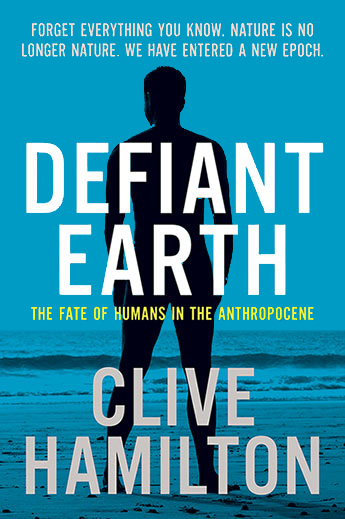A new book by Clive Hamilton puts it in a nutshell: we’re screwed but we don’t know it.
There is just one bottom line in the climate free-for-all – the amount of carbon dioxide in the atmosphere – and this is looking more troubling as each year passes.
Carbon dioxide levels measured in Hawaii rose by a record-equalling three parts per million in 2016, marking five years of unprecedented growth in emissions. Carbon is now being added to the atmosphere over 100 times faster than when Earth emerged from the last ice age.
All technical alternatives to big cuts in our burning of fossil fuels, like removing carbon dioxide from the air and burying it, or shooting sunlight-reflecting particles into space, are either implausible or prohibitively expensive or threats to world peace, or combinations of these.
Australia has spent millions on a low-tech alternative, planting lots of trees, but it’s a delusion. Last week the journal Earth’s Future published a comprehensive European study which finds that planting trees in place of deep cuts to coal, oil and gas use is a waste of time and resources.
The study, led by Lena Boysen of the Institute for Climate Impact Research in Potsdam, Germany, concludes that this strategy would require plantations so big that most natural ecosystems would be eliminated and food production capacity severely reduced.
As emissions keep climbing, the climate signals have become all too clear. Humanity’s addiction to fossil energy got us into this situation, and as a direct consequence it now faces a destabilised Earth system that may already be beyond its control. We are in a new age.
Or perhaps more correctly, a new epoch, the term which science has applied to the time since we emerged from the last ice age, called the Holocene. Earlier geological epochs lasted millions of years; the Holocene has been going just 11,700 years.
A growing number of scientists say that human greenhouse gas emissions have caused a change so dramatic, even cataclysmic, that we can now be said to be in an entirely new epoch. They have proposed the name “Anthropocene”, based on the Greek “anthropos” (human).
In 2009 the International Commission on Stratigraphy formed a working group to look at the Anthropocene idea. It reported last August that the stratigraphic signal from the mid-20th century is distinctive and large enough to justify a new epoch. Approval may take years, but it looks likely.
In 2014 the New York Times environment writer Andy Revkin argued for a “good Anthropocene” in which humanity finds a way to recover from initial disruption, a notion which got a firm rebuke from Canberra-based writer and academic Clive Hamilton.
Such “eco-pragmatists” – people taking a more optimistic position on climate change – “live in a fantasy world of their own construction”, said Hamilton. “Unlike deniers who feel compelled to attack the science, advocates of the good Anthropocene just seem to glide over it.”
One of the sharpest minds in the climate space, Hamilton has just published a book, Defiant Earth, based on this concept. This is a dark, troubling work, the more so because it is no flight of fancy. It is based entirely on what current science is saying about the real world, now.
Hamilton draws attention to a fundamental contradiction in our species’ relationship with the world: we have become so dominant that “we have shifted the geological arc of the planet” yet “we refuse to face up to the profound importance of humans… to the Earth and its future.”
Our civilisation grew out of a benign Holocene. Now, says Hamilton, we face “a different kind of Earth, one that will increasingly render humans and their technologies feeble by comparison.”
While many would reject Hamilton’s thesis, for what it’s worth I don’t. We need hope and optimism, but not when they blind us to reality and the pressing need to act to lessen the damage.
Hamilton posits the possibility of a second civilisation emerging from “the planetary ashes of the old one”, and concludes these new humans would look at those ashes and declare “Never again”. So says Hamilton the rationalist. I’m not so sure.

